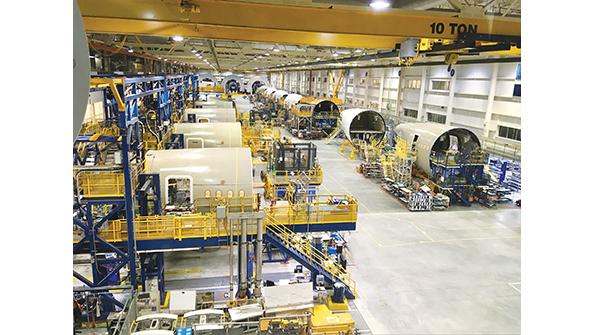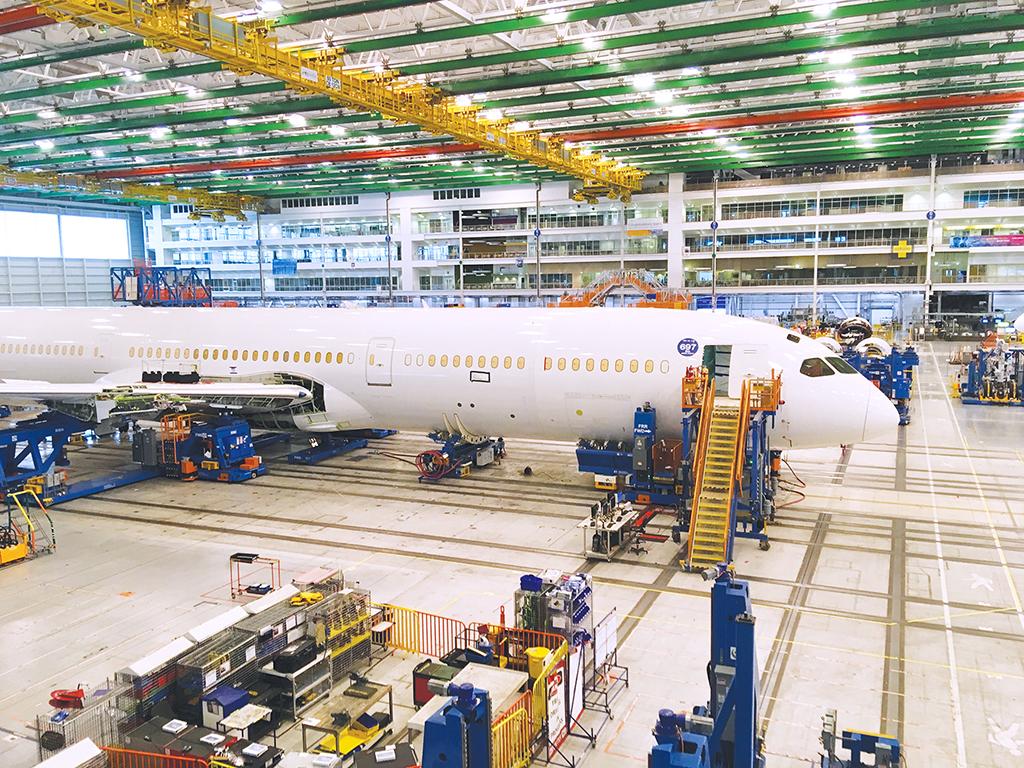
Production mistakes on scores of Boeing 787s will intensify scrutiny of the manufacturer’s quality-control capability and could place it in violation of a 2015 agreement with the FAA triggered by other manufacturing problems, including some on the 787 program.
- Boeing confirms two new 787 production issues
- Hundreds of aircraft could be affected
Boeing has discovered two seemingly unrelated defects introduced in composite fuselage sections during 787 production. A source with knowledge of the issues confirms the more prevalent issue involves shims, or material added during assembly to fill gaps between structures or adjust how pieces fit together to ensure tolerances are met.
The composite material that makes up the 787 fuselage is extremely stiff when cured. Achieving the correct corner angle between the cured part and final shape is hard to control, so shimming is used to make parts of the 787 fuselage sections mate together. In some 787s, Boeing found the shims are not the correct size.
The second defect is an out-of-tolerance problem with the fuselage’s inner mold line. The defect areas exceed Boeing’s 0.005-in. tolerance limit for flatness, the source says.
Boeing determined eight 787s have both defects, which together make those aircraft susceptible to structural failure at loads they should be able to withstand. This prompted Boeing to tell affected operators to ground the aircraft for immediate inspection and likely repairs that will take at least two weeks per airframe. The production issues were first reported by The Air Current.
The manufacturer declines to say how many of the 980 787s built so far have one of the two defects. The source with knowledge of the issue confirms that “many” airframes are affected, while a second industry source says the figure is “several hundred.” Boeing acknowledges there are two separate issues but declines to discuss their scope beyond acknowledging that eight aircraft have both.
“Boeing has identified two distinct manufacturing issues in the join of certain 787 aft body fuselage sections, which, in combination, result in a condition that does not meet our design standards,” the company says. The issues were discovered during a “regular” production-system audit “as part of our quality management system,” Boeing says, adding that it informed the FAA and is working to determine each issue’s “root cause.”
The agency has said little publicly.
“The FAA is aware of the matter and continues to engage with Boeing,” an agency statement says.
Neither problem on its own creates an immediate safety-of-flight issue, Boeing says.
“Individually, these issues, while not up to specifications, still meet limit load conditions. No immediate action is required for the rest of the fleet,” the manufacturer says. “We are analyzing data on the in-service fleet to determine if action is required, potentially including more frequent inspection or rework. It could also be determined that no further action is required if the condition is found to not impact the longevity of the structure.”
Half the 787’s airframe by weight consists of carbon-fiber-reinforced plastic and other composites, which was groundbreaking at the time it entered production. Known issues in a few hundred 787 fuselages in service could provide some of the most comprehensive information to date on how defects progress in pressurized composite airframe structures.
“Aluminum has been around [in airplane design] for 100 years,” one veteran materials engineer and nondestructive testing expert says. “We have a lot of experience with it. Composite structures—we don’t have that history. There’s a big learning curve . . . on these airframes. We can speculate, but we don’t know for sure.”
The latest 787 defects affect the join between the 787’s two composite aft fuselage sections, known as Section 47, which is pressurized, and Section 48, which is unpressurized and supports the empennage, or tail, section. Both sections are made in Boeing’s Charleston, South Carolina, manufacturing facility, which it purchased from Vought Aircraft in 2009. The sections are then joined and moved to one of the two 787 final assembly lines—either in Charleston, which assembles all 787 variants, or in Everett, Washington, which assembles 787-8s and 787-9s.

Boeing has dealt with 787 fuselage-shimming problems in the past. A 2014 FAA review of 787 design, certification and manufacturing states that Boeing “identified a significantly higher number of nonconformances related to shimming as compared to other fuselage sections” with similar design features. “Aft fuselage shimming issues were identified in production and in the full-scale fatigue test,” explains the report, prompted by overheating incidents of in-service lithium-ion batteries that led to the fleet’s 123-day grounding in 2014.
Although most of the shim problems were found and corrected before delivery, five aircraft entered service with “potentially discrepant shims,” leading Boeing to issue an alert service bulletin to ensure they were fixed. The 2014 report cited “a lack of clarity and verification for certain fuel coupling installation requirements” for the problems, adding that they did not comply with Boeing’s quality management system.
Word of new, extensive production issues expands on a long-running series of quality-control deficiencies that have affected several Boeing aircraft programs. In December 2015, Boeing and the FAA agreed to a settlement after the agency dug into two main issues—using noncompliant fasteners and missing deadlines for providing instructions on the installation of fuel tank inerting systems. During the FAA’s probe of those issues, 11 others came to light, including some “production quality-control problems,” the agency said in its 2015 announcement of the settlement.
One issue involved incorrectly installed 787 engine fuel feed manifold couplings. Boeing found three problems with coupling assemblies—incorrectly installed or missing O-rings, lock wires and fastener retaining rings. In November 2012, Boeing revealed that 38 of the first 787s built had at least one of the flaws, and 31 had all three. Fuel leaks on at least two in-service aircraft were traced to the problem, prompting the FAA to issue an immediately effective airworthiness directive in December 2012.
Under the settlement agreement, Boeing agreed to pay $12 million—half of what the FAA proposed—and commit to a series of process improvements. Among them was using a safety management system to “proactively seek continual process improvements and correct undesired conditions,” the agreement says. It also requires Boeing Commercial Airplanes (BCA) to “implement improvements to processes to ensure that assembly installations that have been affected by process or design changes continue to conform to type design.”
The agreement’s “performance period” lasts through January 2021. “In the event that BCA does not meet its commitments under this agreement, BCA and the FAA agree that BCA shall be subject to additional civil penalties up to $24 million,” states the agreement, made public following a 2017 Freedom of Information Act request by The Seattle Times.

Boeing’s latest 787 problems come as it grapples with ongoing quality control issues on its KC-46 tanker and 737 MAX programs. In both cases, numerous instances of tools and other foreign object debris (FOD) left inside completed aircraft have drawn scrutiny and concern.
The U.S. Air Force has halted deliveries of the 767-derivative KC-46 multiple times due to FOD discovered during both routine production and nonroutine rework. The FOD issue is one of several that has hampered the program.
Boeing in recent months made changes to its 737 production line to combat rampant FOD issues discovered in 737 MAX fuel tanks. The model has been grounded since March 2019 to correct design- and training-related shortcomings linked to two fatal accidents in five months, and production was briefly paused earlier this year.
The fallout from the MAX accidents and prolonged grounding have prompted Boeing to make a series of organizational changes aimed at elevating safety concerns to the top of the company and ensuring aircraft are built as designed. One emphasis is granting—many would say returning—more influence to engineers, in part by reorganizing them out of business units and under one line of leadership.
“I believe that the alignment of our company—the centerpiece being the [single] engineering function with its eye on safety—will have the authority and the charter” to drive across-the-board improvements, CEO David Calhoun told Aviation Week in July. The Boeing boss is confident the revamped approach gives the right internal stakeholders “the ownership and the visibility to get ahead of issues, as opposed to catching up to them.”







Comments
When all your products have issues (including the space thingy) the Houston, We Have a Problem.
A complete house cleaning is the only solution. The corporate culture is polluted.